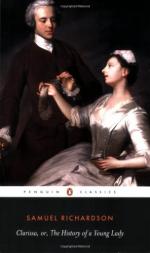’At the same time I must allow, that there are very noble tragedies which have been framed upon the other plan, and have ended happily; as indeed most of the good tragedies which have been written since the starting of the above-mentioned criticism, have taken this turn: The Mourning Bride, Tamerlane,* Ulysses, Phaedra and Hippolitus, with most of Mr. Dryden’s. I must also allow, that many of Shakespeare’s, and several of the celebrated tragedies of antiquity, are cast in the same form. I do not, therefore, dispute against this way of writing tragedies; but against the criticism that would establish this as the only method; and by that means would very much cramp the English tragedy, and perhaps give a wrong bent to the genius of our writers.’
* Yet, in Tamerlane, two of the most amiable characters, Moneses and Arpasia, suffer death.
This subject is further considered in a letter to the Spectator.*
* See Spect. Vol. VII. No. 548.
‘I find your opinion,’ says the author of it, ’concerning the late-invented term called poetical justice, is controverted by some eminent critics. I have drawn up some additional arguments to strengthen the opinion which you have there delivered; having endeavoured to go to the bottom of that matter. . . .
’The most perfect man has vices enough to draw down punishments upon his head, and to justify Providence in regard to any miseries that may befall him. For this reason I cannot but think that the instruction and moral are much finer, where a man who is virtuous in the main of his character falls into distress, and sinks under the blows of fortune, at the end of a tragedy, than when he is represented as happy and triumphant. Such an example corrects the insolence of human nature, softens the mind of the beholder with sentiments of pity and compassion, comforts him under his own private affliction, and teaches him not to judge of men’s virtues by their successes.* I cannot think of one real hero in all antiquity so far raised above human infirmities, that he might not be very naturally represented in a tragedy as plunged in misfortunes and calamities. The poet may still find out some prevailing passion or indiscretion in his character, and show it in such a manner as will sufficiently acquit Providence of any injustice in his sufferings: for, as Horace observes, the best man is faulty, though not in so great a degree as those whom we generally call vicious men.**
* A caution that our Blessed Saviour himself gives
in the case of the eighteen person killed by the fall
of the tower of Siloam, Luke xiii. 4. ** Vitiis
nemo sine nascitur: optimus ille,
Qui
minimis urgentur.——
’If such a strict poetical justice (proceeds the letter-writer,) as some gentlemen insist upon, were to be observed in this art, there is no manner of reason why it should not be so little observed in Homer, that his Achilles is placed in the greatest point of glory and success, though his character is morally vicious, and only poetically good, if I may use the phrase of our modern critics. The AEnead is filled with innocent unhappy persons. Nisus and Euryalus, Lausus and Pallas, come all to unfortunate ends. The poet takes notice in particular, that in the sacking of Troy, Ripheus fell, who was the most just character among the Trojans:




